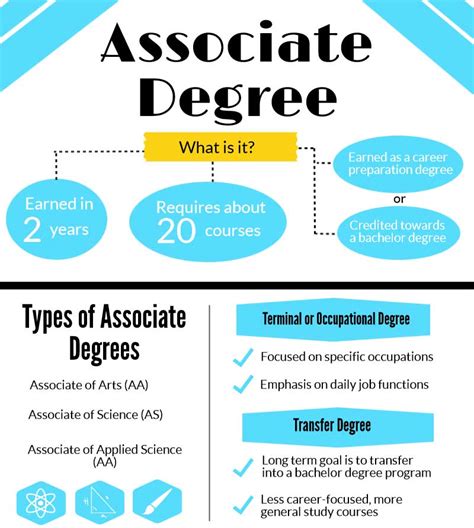An Associate of Arts (AA) degree is a two-year undergraduate academic degree that provides students with a broad foundation in the liberal arts and sciences. Unlike an Associate of Science (AS) degree, which focuses on specific technical or career-oriented skills, an AA degree emphasizes the development of critical thinking, problem-solving, and communication skills.

Benefits of an Associate of Arts Degree
Pursuing an AA degree offers several benefits for students, including:
- Enhanced Job Opportunities: An AA degree can qualify graduates for entry-level positions in various industries, including education, healthcare, business, and government.
- Higher Earning Potential: Individuals with an AA degree typically earn more than those with only a high school diploma. According to the U.S. Bureau of Labor Statistics, workers with an AA degree earn an average of $56,800 per year, compared to $47,200 for those with just a high school diploma.
- Preparation for Further Education: An AA degree provides a solid foundation for students who plan to pursue a bachelor’s degree or transfer to a four-year university.
- Personal Enrichment: The coursework in an AA program expands students’ knowledge and understanding of the world around them, fostering intellectual growth and personal development.
Common Coursework in an Associate of Arts Degree
The curriculum for an AA degree typically includes courses in the following subject areas:
- Humanities: Literature, philosophy, history, art history, music appreciation
- Social Sciences: Psychology, sociology, anthropology, economics, political science
- Natural Sciences: Biology, chemistry, physics, geology
- Mathematics: Algebra, geometry, statistics
- English and Writing: Composition, rhetoric, literature analysis
Career Paths for Associate of Arts Graduates
Graduates with an AA degree have a wide range of career options to choose from, depending on their specific interests and skills. Some common career paths include:
- Education: Elementary and secondary school teacher, early childhood educator
- Healthcare: Medical assistant, nursing assistant, healthcare technician
- Business: Administrative assistant, office manager, human resources specialist
- Government: Administrative clerk, public service representative, social worker
- Arts and Culture: Museum curator, librarian, gallery assistant
Tips for Choosing the Right Associate of Arts Degree Program
When selecting an AA degree program, it’s important to consider the following factors:
- Program Accreditation: Ensure the program is accredited by a recognized accrediting agency, such as the Higher Learning Commission or the Southern Association of Colleges and Schools.
- Transferability: If you plan to pursue a bachelor’s degree, verify that the courses in the AA program are transferable to the four-year institution you intend to attend.
- Cost and Financial Aid: Research the tuition and fees of different programs and explore financial aid options such as scholarships, grants, and loans.
- Program Format: AA programs are typically offered in traditional on-campus formats, online, or through a hybrid combination. Choose the format that best suits your schedule and learning style.
- Faculty and Resources: Consider the qualifications and experience of the faculty and the availability of support services such as tutoring, advising, and career counseling.
Comparing Pros and Cons of Associate of Arts Degrees
Pros:
- Broadens knowledge and skills
- Enhances job prospects
- Prepares for further education
- Offers an affordable pathway to higher education
Cons:
- May not lead to specialized skills for specific careers
- May require additional coursework for bachelor’s degree
- Transferability may be limited to certain four-year institutions
- Not all industries require an Associate of Arts degree
Conclusion
An Associate of Arts degree provides a valuable foundation for students seeking to expand their knowledge, enhance their career prospects, or prepare for further education. With its focus on critical thinking, communication, and problem-solving, an AA degree empowers graduates to succeed in a variety of roles and industries. By carefully considering the benefits, coursework, career paths, and program options, students can make an informed decision about whether an AA degree is the right path for them.
